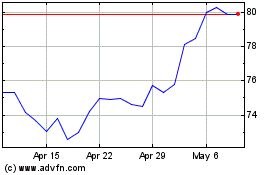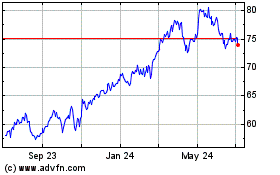EU, U.S. Reach Trans-Atlantic Agreement Over Insurance Rules - 3rd Update
January 13 2017 - 12:47PM
Dow Jones News
By Julia-Ambra Verlaine and Jacob M. Schlesinger
The U.S. and European Union have reached a trans-Atlantic
agreement to smooth the ability of insurance companies to operate
in the two regions, officials said Friday.
The agreement, reached after more than 20 years of discussions
and almost a year of formal negotiations, aims to remove regulatory
uncertainty for American insurers that do business in Europe.
Meanwhile, EU reinsurers will benefit from changes to collateral
requirements that could save them hundreds of millions of
dollars.
American International Group Inc. and MetLife Inc. are among the
biggest U.S. insurers with European operations. AIG declined to
comment. MetLife didn't have an immediate comment.
"This is a very welcome development for U.S. insurers" as it
"will enable them to write business in the EU insurance market and
will alleviate their long-standing concern that lack of equivalence
would restrict their ability to be globally competitive in an
ever-increasingly competitive insurance marketplace," said Howard
Mills, global insurance regulatory leader for consultancy Deloitte
Services LP and a former New York state insurance commissioner.
Trade associations representing reinsurers and insurance
companies across the U.S. -- the American Insurance Association,
the American Council of Life Insurers and the Reinsurance
Association of America -- in a joint statement said they welcome
the deal, saying it "seeks to resolve significant insurance and
reinsurance regulatory issues for companies doing business in both
jurisdictions."
Negotiators worked to close out an agreement in the final days
of President Barack Obama's administration, in part because the
U.S. political transition could have led to further delays as new
officials take over for the incoming Trump administration.
Under the agreement, American insurers won't be subject to new
EU insurance regulations, known as Solvency II, that went into
effect a year ago.
Europe's regime seeks to ensure insurers have enough capital to
weather severe losses and to establish unified requirements across
the bloc. The rules apply only to European firms, but EU
representatives had called for "equivalent" regulatory oversight of
non-European insurers operating in EU countries.
EU reinsurers could save about $400 million a year in collateral
costs in the U.S., according to the European Commission, the EU's
executive arm, because collateral requirements for reinsurers
operating overseas will be eliminated.
A third pillar of the deal, which isn't binding, is a set of
principles outlining how American and European insurance
supervisors should exchange information with one another to
mitigate risks in the sector.
EU national governments and the European Parliament have to
approve the agreement. The commission hopes to expedite the process
by requesting to sign on behalf of member states, which shortens
the process.
The Office of the U.S. Trade Representative and the Treasury
Department, which also joined in the negotiations, sent letters to
Congress notifying members of the deal, kicking off the 90-day
scrutiny period before U.S. authorities can sign the agreement.
"This agreement will provide opportunities for U.S. insurers and
reinsurers doing business in the EU while continuing to ensure a
high standard of protection for U.S. and EU consumers," U.S. Trade
Representative Michael Froman said in a statement.
Write to Jacob M. Schlesinger at jacob.schlesinger@wsj.com
(END) Dow Jones Newswires
January 13, 2017 12:32 ET (17:32 GMT)
Copyright (c) 2017 Dow Jones & Company, Inc.
American (NYSE:AIG)
Historical Stock Chart
From Mar 2024 to Apr 2024

American (NYSE:AIG)
Historical Stock Chart
From Apr 2023 to Apr 2024
